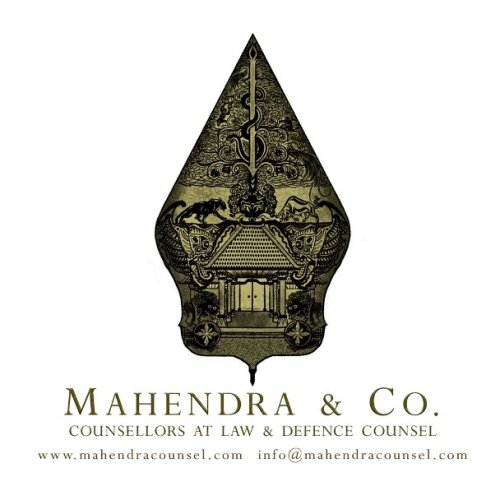Best Trusts Lawyers in Semarang
Share your needs with us, get contacted by law firms.
Free. Takes 2 min.
List of the best lawyers in Semarang, Indonesia
About Trusts Law in Semarang, Indonesia
Trusts law in Semarang, Indonesia, governs the establishment and management of trusts, which are legal arrangements where a person (the settlor) transfers assets to a trustee to be held for the benefit of beneficiaries. Trusts are commonly used for estate planning, asset protection, and charitable purposes.
Why You May Need a Lawyer
There are several situations where you may need a lawyer for trusts in Semarang, Indonesia, such as creating a trust, interpreting a trust document, resolving disputes among beneficiaries, understanding tax implications, or modifying an existing trust. A lawyer can provide guidance and ensure that your interests are protected.
Local Laws Overview
Key aspects of local laws relevant to trusts in Semarang, Indonesia, include the Civil Code, which regulates trusts, the Trust Law that governs the establishment and administration of trusts, and tax laws that impact trusts. It is essential to comply with these laws to ensure the validity and effectiveness of your trust.
Frequently Asked Questions
Q: What is a trust?
A trust is a legal arrangement where assets are transferred to a trustee to hold for the benefit of beneficiaries.
Q: Who are the parties involved in a trust?
The parties involved in a trust are the settlor (the person who creates the trust), the trustee (the person who manages the trust), and the beneficiaries (the people who benefit from the trust).
Q: How do I create a trust in Semarang, Indonesia?
To create a trust, you need to execute a trust document specifying the terms and conditions of the trust and transfer assets to the trustee.
Q: What are the duties of a trustee?
A trustee has a fiduciary duty to manage the trust assets prudently, act in the best interests of the beneficiaries, and follow the terms of the trust.
Q: Can a trust be revoked or modified?
Depending on the terms of the trust and local laws, a trust may be revocable or irrevocable. Modifying a trust typically requires court approval.
Q: What are the tax implications of a trust in Semarang, Indonesia?
Trusts may be subject to taxation on income and capital gains. It is essential to consult with a tax advisor to understand the tax implications of your trust.
Q: How can I resolve disputes among beneficiaries?
Disputes among beneficiaries can be resolved through mediation, arbitration, or litigation. Consult with a lawyer to explore your options.
Q: Can a trust protect assets from creditors?
Depending on the type of trust and local laws, a trust may provide asset protection from creditors. Consult with a lawyer to determine the best asset protection strategy for your situation.
Q: What happens to a trust when the settlor passes away?
Upon the death of the settlor, the trust assets are typically distributed to the beneficiaries according to the terms of the trust. Consult with a lawyer to ensure proper administration of the trust.
Q: How do I choose a trustee for my trust?
When choosing a trustee, consider someone who is trustworthy, competent, and capable of managing the trust assets in the best interests of the beneficiaries. You may also consider a corporate trustee for professional trust management.
Additional Resources
For more information on trusts in Semarang, Indonesia, you can refer to the Ministry of Law and Human Rights, local law firms specializing in trusts, and legal publications on trusts law.
Next Steps
If you need legal assistance with trusts in Semarang, Indonesia, it is advisable to consult with a trusted lawyer specializing in trusts law. They can provide personalized advice and guidance based on your specific situation and help you navigate the complexities of trusts law effectively.
Lawzana helps you find the best lawyers and law firms in Semarang through a curated and pre-screened list of qualified legal professionals. Our platform offers rankings and detailed profiles of attorneys and law firms, allowing you to compare based on practice areas, including Trusts, experience, and client feedback.
Each profile includes a description of the firm's areas of practice, client reviews, team members and partners, year of establishment, spoken languages, office locations, contact information, social media presence, and any published articles or resources. Most firms on our platform speak English and are experienced in both local and international legal matters.
Get a quote from top-rated law firms in Semarang, Indonesia — quickly, securely, and without unnecessary hassle.
Disclaimer:
The information provided on this page is for general informational purposes only and does not constitute legal advice. While we strive to ensure the accuracy and relevance of the content, legal information may change over time, and interpretations of the law can vary. You should always consult with a qualified legal professional for advice specific to your situation.
We disclaim all liability for actions taken or not taken based on the content of this page. If you believe any information is incorrect or outdated, please contact us, and we will review and update it where appropriate.








